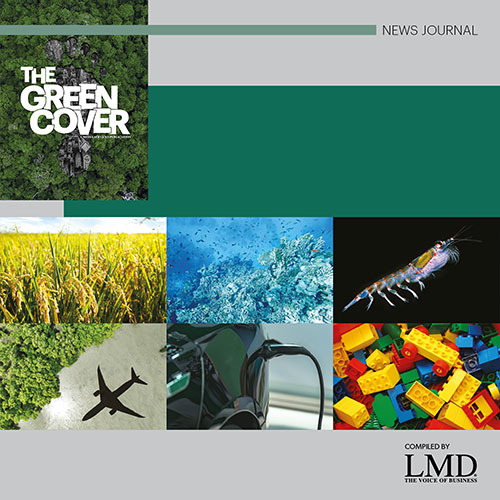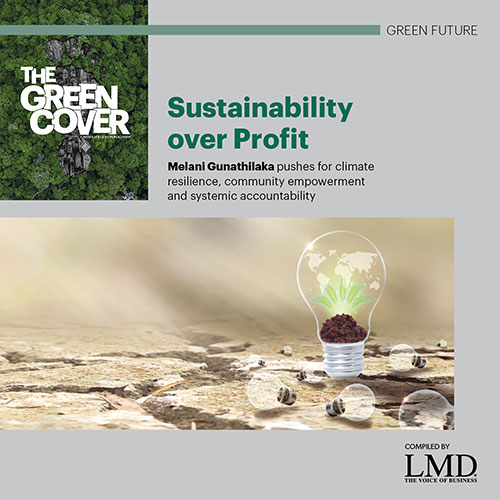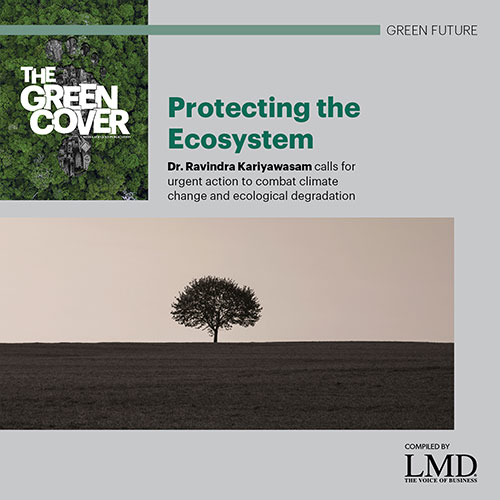CORPORATE PROFILES
JOHN KEELLS HOLDINGS

Q: How effective are corporate environmental policies?
A: As a responsible corporate citizen, the John Keells Group has always had a triple bottom line focus – i.e. people, planet and profit.
The group’s continued commitment to sustainability throughout our operations and value chain provided the impetus for the launch of the Plasticcycle initiative, which is a social entrepreneurship project with the vision of being a catalyst to substantially reduce plastic pollution in Sri Lanka.
This initiative enhances the alignment of the group’s strategies, initiatives and targets with the UN Sustainable Development Goals (SDGs).
Sri Lankan consumers are now more socially conscious, and hold businesses accountable for how they operate and the resulting impacts on the environment. This has driven businesses to adopt corporate environmental policies.
 Q: Is the country doing enough to protect the environment from plastic pollution? And what are the main hurdles?
Q: Is the country doing enough to protect the environment from plastic pollution? And what are the main hurdles?
A: Significant strides have been taken in terms of environmental policies that address plastic pollution, which has augmented the work done by individuals and organisations in this space across Sri Lanka.
These include the staggered bans on selected single-use plastic packaging and products, as well as discussions around extended producer responsibility (EPR) and regulations needed to implement them.
We’re hopeful that the government responds positively to modern trade’s attempt to reduce the demand for single-use plastic bags by approving the implementation of a plastic bag charge. This is an intervention championed by Plasticcycle, the framework for which has been presented to the Ministry of Environment together with the Sri Lanka Retailers’ Association (SLRA).
 Hurdles that impede real change include the difficulty of changing consumer behaviour that still prioritises cost and convenience over environmental impacts when making purchasing decisions.
Hurdles that impede real change include the difficulty of changing consumer behaviour that still prioritises cost and convenience over environmental impacts when making purchasing decisions.
Meanwhile, businesses need to find innovative ways to deliver goods and services with minimal impacts on the environment.
Finally, it’s imperative for legislators to acknowledge that passing laws without adequate monitoring mechanisms results in subpar outcomes.
 Q: What is the role of corporates in the effort to reduce plastic pollution in Sri Lanka?
Q: What is the role of corporates in the effort to reduce plastic pollution in Sri Lanka?
A: Corporates have a strategic role to play in this context by seeking opportunities to reduce their plastic footprint and encouraging all stakeholders to do the same.
Being the largest listed conglomerate in Sri Lanka with a nationwide presence and touch points with a multitude of stakeholders, we believe that the John Keells Group is positioned to make a difference in this space through the Plasticcycle initiative.
While we have implemented diverse initiatives internally to reduce the group’s plastic footprint and will continue to evaluate all opportunities to do so, Plasticcycle engages with various external stakeholders at a community level, across the recycling ecosystem and regulators, to support the implementation of sustainable and scalable solutions.
Q: Could you outline some of the Plasticcycle initiative’s successes?
A: The success of our Plasticcycle bin placement initiative has helped us to provide avenues for the public to dispose of recyclable plastic waste responsibly. People voluntarily making use of this without any financial incentives makes the outcome even more rewarding.
Our partners for this initiative include John Keells Group brands such as Elephant House Beverages, Walkers Tours, Cinnamon Wild Yala and Keells, and other like-minded corporates like Softlogic GLOMARK supermarkets, LAUGFS Supermarkets and Hemas Manufacturing.
 At present, we have placed more than 250 recyclable plastic collection bins in key locations across the country, which was possible through corporate partnerships and engagement with local communities. These locations include supermarkets, schools, universities, public parks, apartment complexes, hospitals, tourist hotspots and the Southern Expressway exit points.
At present, we have placed more than 250 recyclable plastic collection bins in key locations across the country, which was possible through corporate partnerships and engagement with local communities. These locations include supermarkets, schools, universities, public parks, apartment complexes, hospitals, tourist hotspots and the Southern Expressway exit points.
To make a real difference however, we recognise the need for greater awareness of the associated challenges and a collective commitment from all stakeholders, and an understanding of the adverse effects of our decisions and behaviour on the wellbeing of interconnected ecosystems.
We still have much to do to tackle local and global levels of pollution, and single-use plastic is a major contributor to this. Therefore, we need to look for innovative interim interventions until more permanent solutions can be identified. This requires a commitment to drive change – even through incremental steps by all concerned.
Nisreen Rehmanjee
Executive Vice President
Head of Corporate Finance, Group Tax and Social Entrepreneurship Project
Telephone 2306146 | Email plasticcycle@keells.com | Website www.plasticcycle.lk





